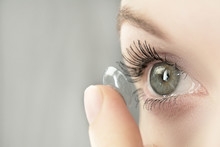Cleaning your contact lenses
U.S. Food and Drug Administration (FDA)
Cleaning contact lenses with hydrogen peroxide solutions takes special care. Follow all directions to avoid stinging, burning and possible damage to your eyes.20
If you wear contact lenses, the way you clean and disinfect them can affect your vision and health.
Following instructions from your eye care professional and from the contact lens solution manufacturer are especially important if you use a solution that contains hydrogen peroxide.
Hydrogen Peroxide Solution
Contact lens solutions are sold over the counter, which means that you don’t need a prescription. But not all over-the-counter solutions are the same.
Solutions that contain hydrogen peroxide are one type of solution used to clean and disinfect contact lenses.
Hydrogen peroxide solutions are generally preservative-free, which makes them an option for people who are allergic or sensitive to the preservatives found in multipurpose solutions.
Safely Using Hydrogen Peroxide Solution
Generally, incorrect care of contacts can increase your risk of eye infections and injury, and can cause blindness in rare cases.
Using hydrogen peroxide solution takes special care. Do not put the solution directly in your eyes because it can cause irritation, stinging and burning and can damage your cornea, which is the clear surface that covers your eye. Hydrogen peroxide solution requires a step called “neutralization.” That process turns peroxide into water and oxygen and makes it safe for you to put the lenses back into your eyes. Don’t skip the neutralization step, and make sure to follow the manufacturer’s instructions.
Look at the label on the kit so you know how the neutralization process works. Most products on the market are one-step, which means they contain a contact lens case with a built-in neutralizer that works during the disinfecting stage. If the case doesn’t have a built-in neutralizer, you add a neutralizing tablet after disinfecting, so it’s a two-step process.
This video may be helpful: https://www.fda.gov/consumers/consumer-updates/contact-lenses-safe-use-hydrogen-peroxide-solution.
Hydrogen Peroxide Solution Safety Tips
• Talk with your eye care professional about which type of cleaning and disinfecting method is best for you.
• Follow all contact lens care instructions from your eye care professional and the hydrogen peroxide solution manufacturer.
• Do not put hydrogen peroxide solution directly into your eyes. Do not rinse your contacts with hydrogen peroxide solution that is not neutralized before putting them in your eyes.
• Always use the special contact lens case that comes with each new bottle of solution. Never reuse an old contact lens case.
• Do not share your hydrogen peroxide solution as others may not use it according to directions.
• Note the red tip and cap on most bottles of hydrogen peroxide solution. It’s a way to recognize that hydrogen peroxide is inside and takes special care.
Bad Reactions Associated with Hydrogen Peroxide Solution
Hydrogen peroxide contact lens care products are safe and effective when used properly. To help manufacturers communicate warnings about the products and how to correctly use them, in 2023, the FDA issued guidance with labeling recommendations; see them here:
https://www.fda.gov/regulatory-information/search-fda-guidance-documents/hydrogen-peroxide-based-coetntact-lens-care-products-consumer-labeling-recommendations-premark.
If you think you’ve had a bad reaction from a hydrogen peroxide solution, contact your eye care provider. You also can voluntarily report adverse events to hydrogen peroxide solution or any other contact lens care product to MedWatch, the FDA’s safety information and adverse event reporting program, at https://www.fda.gov/safety/medwatch-fda-safety-information-and-adverse-event-reporting-program.
